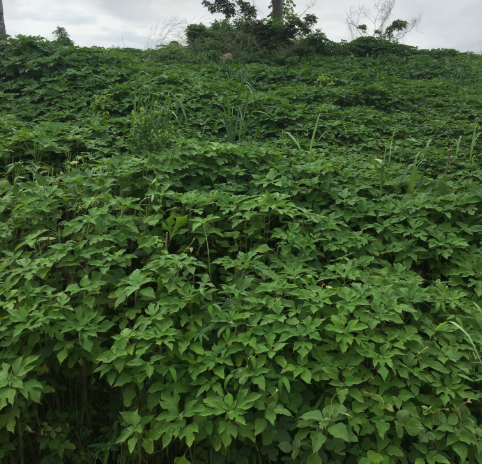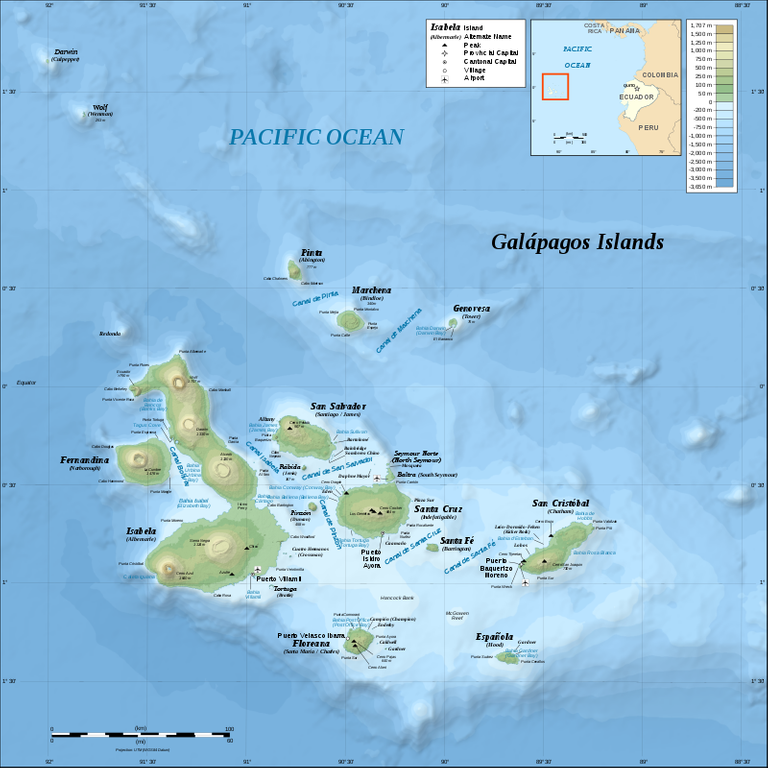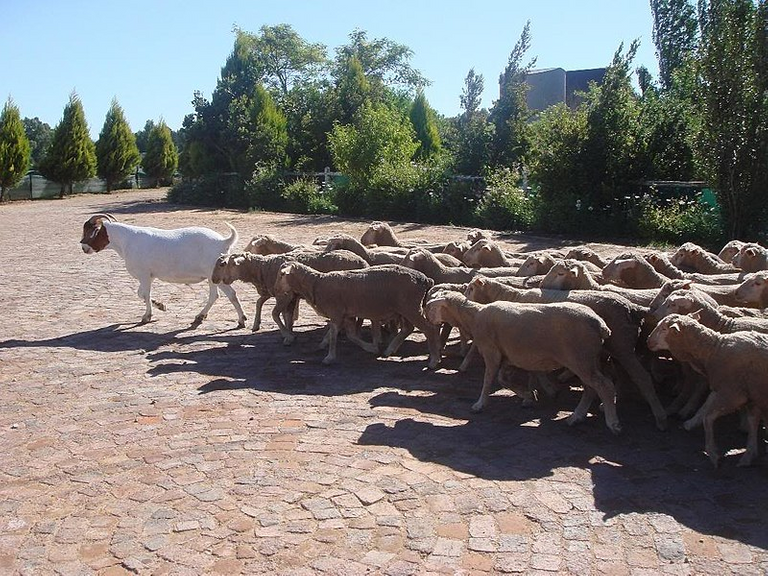The similitude of immigrants and invasive species
When Darwin was taking a journey through the Galapagos islands and developing the theory of natural selection, little did he know that this theory could be a major hindrance to globalization. When people talk about the world being a global village, one would expect to see a situation in which there are no boundaries, no red tapes to the movement of people from one country to another, etc. But that is not really the case. Hence, what we have is 'faux globalization'.

History always repeats itself. In countries like South Africa and the United State, immigrants have always been seen as a threat to the native people. The most recent xenophobic attack that took in South Africa is still fresh in the memory where the natives accused immigrants (mostly blacks anyway) of taken their jobs, their women, and even as far as peddling drugs within their country. The natives in the United States have similarly been complaining of the economic and educational dominance of immigrants. How true are these accusations?
The curious case of Charles
Charles has spent all his life growing up in Nigeria. His education up to the first-degree level was in Nigeria where 80 to 100% of the subjects were theories and 0 to 20% practicals. He worked from 8 am to 8 pm for about 3 years in an organization that pays less than $300 per month. His family has been living from hand to mouth until he got the opportunity to migrate to the United State.
Within a few weeks of migrating to the United States, Charles was able to secure a job that pays him about $20 per hour. For someone that is already used to working 12 hours per day for less than $300 a month, working 6 - 8 hours a day and earning $120 to $160 in the process was a piece of cake. The natives that are not used to working for such long hours started seeing him as a threat.
Charles decided to pursue another degree after having a significant amount in his savings. He enrolled for a postgraduate degree in which up to 50% of the courses were practicals or simulations. For someone that has been used to theories all his life, he had a bit of challenge adapting academically. He was later able to pick up and in no time, emerged the top student in his class. Other students started seeing him as a threat to their academic superiority.
Exotic species almost always outcompete native species
In the case of Charles above, he was able to outcompete the native Americans due to his upbringing. The hustles and bustles of being a Nigerian in Nigeria had toughened him up and as a result, he was able to slot in almost seamlessly and outcompete the natives in an environment that is not as tough as Nigeria's.
This is a similitude of invasive species. Plant or animal species that are introduced to new environments usually spend some time adjusting to their new environment. They either get acclimatized at the end of the day or die trying in the process. Once they are able to adapt to their new environment, they often outcompete the native plant or animal species and spread at a fast rate.
All over the world, ecologists are dealing with the nuisance created by invasive species. They reduce the biological diversity of an area and as such, several important species become extinct. The nuisance that invasive plants create to agriculture is well known by researchers; perhaps only farmers can tell the story. Generally, the problems that invasive species, be it plants or animals, create can be summarised as economic, environmental, and social impacts.
Fighting invasive species

All over the world, different methods are being put in place to tackle the menace of invasive species, be it plant or animal. The various methods for controlling invasive species fall into 3 main categories:
- Biological controls
- Chemical controls
- Mechanical controls
Biological controls involve all forms of efforts tailored towards manipulating the natural enemies of the invasive species in order to limit its spread. For example, if a particular invasive plant is edible to herbivores, introducing herbivorous animals into the area where the invasive plants are found will limit its spread.
Chemical controls involve the use of relevant chemicals to limit the proliferation of invasive species while mechanical controls involve physical removal of invasive species in order to limit their population. An integrated approach involves a mix of all the 3 methods.
Going to war with an invasive species
The Galapagos Islands represents a historical area in the understanding of evolution. The study of various species in the area by Darwin led to the development of the theory of evolution. The Islands were doing fine biodiversity-wise until the introduction of goats by whalers and mariners in the 70s.

Seven years after, when it became obvious that the goats will not stop proliferating and chasing other species in the region into extinction, scientists came together and devised a way forward. This led to the great battle against goats on the Islands.
Trained snipers on helicopters were hired to eliminate the goat's population and within a short period, the population reduced and the Island started regenerating. Goats being social animals started hiding away whenever they heard the sound of helicopters and it became increasingly difficult to remove the remaining population of the goats. The implication is that within a short period, the goats will multiply and the population will boom again.
The Judas goat
The need to eliminate the entire population of goats in order to prevent their regeneration led to the introduction of Judas goats. A judas goat is a sterile, gps-tagged goat that acts like an agent provocateur. A few of them were introduced to the Islands and within a short period, these goats were able to team up with the remaining goats within the Island. The GPS gave up the location of the goats and sniper helicopters were able to move-in to eliminate them, sparing only the Judas goats in the process.

With the introduction of the Judas goat, about 99% of the goat's population on the Islands was eliminated. It was really a great and tactical battle against an invasive species.
Twitter link: https://twitter.com/gentlesaham/status/1267905167460048896?s=20
Thanks for your contribution to the STEMsocial community. Feel free to join us on discord to get to know the rest of us!
Please consider supporting our funding proposal, approving our witness (@stem.witness) or delegating to the @stemsocial account (for some ROI).
Thanks for using the STEMsocial app and including @stemsocial as a beneficiary, which give you stronger support.
I am first time hearing about Judas goat! +_+
So did I :)
You are welcome... :)
There is maybe one thing missing from this great post (I really enjoyed reading it). Some times, the "invasive" species is integrated through the native population and allows the latter for rising up. Yes they bring competition (which is IMO healthy), but they also bring novelties that can be incorporated and make the future brighter. I was thinking about that when reading the story of Charles.
I thought about the same. What is your take on a nation where people are competing in an unhealthy manner? I think this is what happening in US. Off-topic perhaps. But interested to know your take on it. Only winners are celebrated and losers are literally thrown out of the system!
As I said, a healthy competition that is beneficial for everyone happens... sometimes... not always definitely.
I don't have all pieces of information for the US, especially was for what concerns the present situation, we only see in the media the bad guys from all sides... To go back to the topic, competition could be always positive if we remove the boundary conditions (like races, etc...). However, those conditions are never removed and the human behaviour screws up everything,
Indeed. Its not like invasive species don't have their uses but the fact that they spread and eliminate other species in their paths makes them a threat. In biodiversity lies the future of man, anything that threatens biodiversity is a threat to human existence.
True, it is not a real invasion :)
@gentleshaid, this is an interesting piece. I fell in love with the way you introduced this post. Anyway, invasive species from the way they compete with host community can be very dangerous. Immediate action needs to be taken to reduce their increase, but this should not be the case with human who only seeks for greener pasture. But if while doing that, he breaks the law of the land, i think the law should take its full course and people should not take law into their own hands. Nice piece